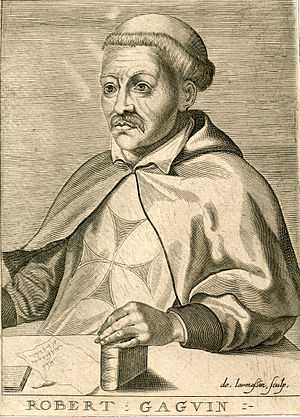Robert Gaguin

Robert Gaguin (older spelling: Robert Guaguin, around the winter of 1433 – May 22, 1501) was a French Renaissance humanist and philosopher, he was minister general of the Trinitarian Order. He was born Calonne-sur-la-Lys near Béthune in what was the county of Flanders and the Duchy of Burgundy, his father was Orphelin and his brother was Christophe.[1] He later attended the University of Paris.
He was an influential humanist, who was a friend of Publio Fausto Andrelini from Forlì, an associate of Erasmus and a student of Gregory Tifernas.[2]
In his later years, he published a reformation of statues of the Trintarian Order on August 30, 1497. He died in Paris on May 22, 1501 at the age of sixty-seven and interred at the church of the Covent of Mathurins.
He also translated several works from Latin to Middle French including Caesar's Gallic Wars which was printed in Paris in 1495 at Antoine Vérard's library, works from the third decade of Titus Livius, Jean Pic de la Mirandole's Conseils prouffitables contre les ennuis et tribulations du monde in 1498 also from the original Latin and Alain Chartier's Curial from the original Latin in 1473.
Works
- Epistole et orationes
- Rerum gallicarum annales, History of France
- Chronicle of the General Ministers of the Order of the Holy Trinity.
Epitaph
His epitaph after his death read:
- Christe, salus hominum, meritorum æquissime censor,
- Servulus ecce tuus pro carnis lege solutus
- Dormit, et exspectat quo mentem examine verses.
- Peccavi, miserere, nec horrida pende flagella
- Criminibus : tua sum factura, perennis imago.
- Quod fuit humanum tellus vocat, accipe sanctam
- Effigiem, Rex magne, tuam quam percupit hostis.
- Tu vitam et mores, tu mentis condita nosti.
- Omnia sunt in spe, tantum miserere Gaguino.
See also
References
Bibliography
- Louis Thuasne (ed.), Roberti Gaguini Epistole et orationes, Paris, Bibliothèque littéraire de la Renaissance, Émile Bouillon, 1903
- Sylvie Charrier, Recherches sur l'oeuvre latine en prose de Robert Gaguin (1433-1501), Paris, H. Champion, 1996.
- Franck Collard, Un historien au travail à la fin du XVe siècle: Robert Gaguin, Geneva, Droz (Travaux d'humanisme et Renaissance, ??), 1996, p. 68
External links
|